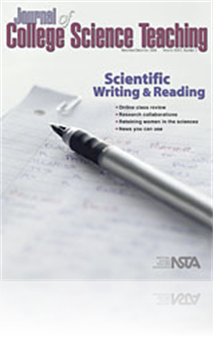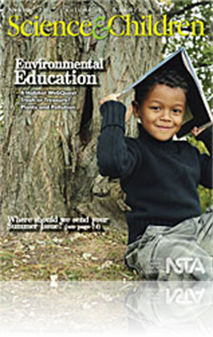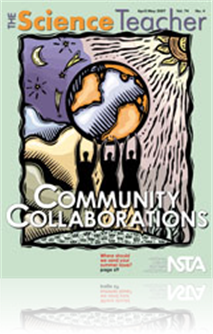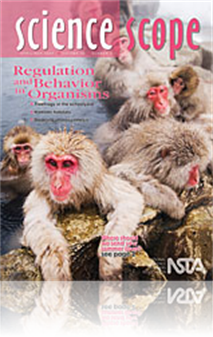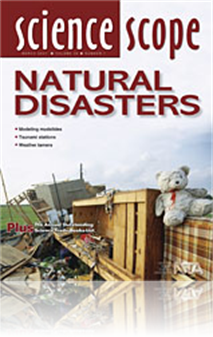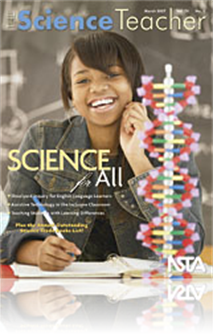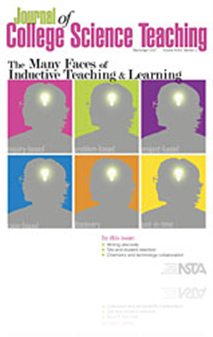All Resources
Journal Article
It’s no secret that many school programs don’t give children enough opportunity to explore the natural world—i.e., to “mess about” and to have firsthand experience with nature and animals. Not so at the Muscota New School in New York City! ...
Journal Article
The WebQuest is a four-step process integrated at appropriate points in the Animal Studies unit. Through the WebQuest, students create a series of habitat maps that build on the knowledge gained from conducting the various activities of the unit. The...
Journal Article
Editor's Note: Looking at Environmental Education
Science education must prepare students to make informed personal and political decisions. Many of those decisions will revolve around issues of the environment. We are drenched daily in reports about alarming environmental trends. The learning envi...
Journal Article
Ask the Experts—April/May 2007
The experts address the following question in this month’s column: What color is the blood in a person’s veins? I’ve heard it described as “blue,” but it looks to me to be dark red, as it appears when blood is drawn during a lab test....
Journal Article
Science Sampler: The DEP saves the beans—A Performance assessment task for acid rain
Using performance assessment tasks allows students to demonstrate conceptual understanding of the important ideas of science, use scientific tools and processes, apply understanding of ideas to solve new, draw on what was learned to form explanations...
Journal Article
Idea Bank: Learning Through Stories
While studying gas laws, high school chemistry students at Unionville High School in Kennett Square, Pennsylvania, created children’s books about the properties of gases, geared toward ages 8-12, to display their understanding of the science conten...
Journal Article
The Early Years: The Sun's Energy
Understanding the connection between the Sun’s energy and sustaining life is difficult for preschoolers, but learning about these concepts through both long and short-term activities captures children’s short attention spans. Activities such as ...
Journal Article
Fires, Floods, & Hurricanes: Is ENSO to Blame?
Scientists have associated the El Niño/Southern Oscillation (ENSO) phenomenon with extreme climate events such as flooding in California, droughts in Australia, fires in Indonesia, and increased hurricane activity in the Atlantic Ocean. Because most...
Journal Article
Science Shorts: Energy in Motion
Children experience forces at work while on the playground, in gymnasiums, and in toy stores. Scooters, baseball bats, basketballs, and jump ropes all need pushes or pulls to make them move. When objects change shape as they are pushed or pulled, we ...
Journal Article
Commentary: The Cost of Teacher Turnover in Math and Science
Personnel turnovers can create instability for students, schools, and school districts. What are the costs of these changes? What are the causes of these changes? What information can research contribute to understanding the situation? In October 200...
Journal Article
The Many Faces of Inductive Teaching and Learning
Science courses are traditionally taught deductively. The instructor first teaches students relevant theory and mathematical models, then moves on to textbook exercises, and eventually—maybe—gets to real-world applications. Often the only motivat...
Journal Article
Tech Trek: In the eye of all beholders
Save for the subject of art perhaps, the teaching of no other discipline in K-12 schools is more reliant on vision than science. In fact, the core of science study involves observation in a controlled environment and the use of labs for observing nat...
Journal Article
Assistive Technology in the Inclusive Science Classroom
Assistive Technology (AT) can be any item, piece of equipment, or teacher-made product that is designed to improve a student’s functional capability or help a student succeed in accessing the general education curriculum. Lahm and Morrissette (1994...
Journal Article
Science Sampler: Connecte2d Teaching—A comprehensive resource for teaching science using earthquakes
The Connecte2d Technology website is an all-inclusive web resource linking the study of earthquakes and engineering design to middle school science, mathematics, and technology. Through the use of interdisciplinary activities and hands-on projects, s...
Journal Article
Maria lifts up a book from the table. Dietre eats cereal for breakfast. Akisha winds up a toy robot. Jacob puts batteries in a flashlight. These seemingly dissimilar events demonstrate various ways children experience energy daily. You can help prima...
Journal Article
Science for ELLs: Rethinking Our Approach
Many educators feel ill-prepared to meet the academic needs of students from culturally and linguistically diverse backgrounds. As educators, we strive to guarantee science education opportunities for all students. Although much remains unknown, cu...
Journal Article
Favorite Demonstration: The School Dance, According to Le Chatelier
When teaching science, or any other topic, an example of the concept being taught taken from students’ past experiences is often valuable. A familiar situation can reduce the anxiety of an unfamiliar or intimidating subject and can make it more man...
Journal Article
In sixth grade, students understand that Earth gets visible light from the Sun, but students may also believe the Earth gets heat from the Sun. This last part is incorrect because the Sun is too far from the Earth to heat it directly. So, how does t...
Journal Article
Perspectives: Assessing for Science Learning
Often the word assessment conjures up the notion of tests or quizzes that occur at the end of a lesson or a unit. These summative assessments take place when an instructional sequence is completed, providing a summary of what students learned. The su...
Journal Article
Schoolyard Inquiry for English Language Learners
This article presents outdoor inquiry activities to help English Language Learner (ELL) students learn life science concepts. Through inductive outings, nature journaling, and multicultural gardening, beginner and intermediate students gain science-i...
Journal Article
Libros de Ciencias en Espanol (2007)
From eye-catching introductions to planets, animals, food, and the senses for the very young, to little-known aspects of dinosaurs, to the importance of food chains, these recently published books in Spanish are sure to engage and inform young Span...
Journal Article
Career of the Month: An interview with Honey Bee Scientist Eric Mussen
It’s common knowledge that honey bees collect nectar from flowers to make honey. But did you know honey is the only food we consume that is produced by insects? In addition, bees pollinate (fertilize) a staggering one-third of what we eat every day...
Journal Article
Every Day Science Calendar: March 2007
This monthly feature contains facts and challenges for the science explorer. ...
Journal Article
Outstanding Science Trade Books for Students K—12: Books Published in 2006
Apples and oranges … and lychees and loquats—how can one compare? That’s the challenge when a team of NSTA’s best science educators attempt to select the best of each year’s science trade books. It’s been 34 years since NSTA joined forces...
Journal Article
Idea Bank: A 50-Cent Analytical Spectroscope
“How do we know all that we know about the stars, since they are so far away and no one from Earth has ever visited them?” A fair question to be sure. While astronomers believe they have decent estimates of the mass, temperature, size, and compo...
Journal Article
Librarians instruct students where to find information, but rarely demonstrate its management, while faculty have difficulty incorporating real-time laboratory experience with library research. This paper focuses on the development of a hands-on biol...
Journal Article
Science 101: What exactly is energy?
It isn’t an easy task to explain what energy is. For that simple answer, let’s head to your average science textbook and retrieve the following: “Energy is the ability to do work.” Okay, but what does that mean? What do we mean by work? Even ...
Journal Article
Scope on the Skies: Total lunar eclipse
On March 3, 2007, the Moon will be at its descending node, crossing the Earth’s orbital plane, moving southward. The Moon will also be at 100% illumination, or at full Moon, during the node crossing. These are the requirements for a lunar eclipse t...
Journal Article
Scientific Discovery for <em> All </em>
The scientific discovery process comes alive for 70 minority students each year at Uniondale High School in New York where students have won top awards for “in-house” projects. Students develop projects from an original idea that interests them, ...
Journal Article
Science Sampler: Earthweek in the classroom—Students monitoring a dynamic planet
Exploding frogs in Germany, new volcanic islands emerging in the Pacific Ocean, Avian Influenza spreading worldwide—these are just a few of the stories in Earthweek, an online log of natural events. The weekly report chronicles events around the w...
Journal Article
Outstanding Science Trade Books for Students K-12: Books Published in 2006
Apples and oranges… and lychees and loquats—how can one compare? That’s the challenge when a team of NSTA’s best science educators attempt to select the best of each year’s science trade books. It’s been 34 years since NSTA joined forces ...
Journal Article
The Journal of College Science Teaching is one of four journals published by the National Science Teachers Association. Each of the journals serves the educators working at a different level of education. JCST shares some of its processes with these ...
Journal Article
Science Sampler: Students learn best by teaching
Traditionally, science fair projects allow students to share their personal investigations about nature. In a science fair presentation, a student typically lectures, pointing out observations, data, analysis, and conclusions to a disinterested audie...
Journal Article
Using Clay Models to Understand Volcanic Mudflows
Gravity is a subtle but ubiquitous force that influences nearly all geologic processes from the formation of ores to the flow of glaciers and rivers. Gravity also determines the path some materials take as they flow down volcanoes. Lava flows, mudflo...



